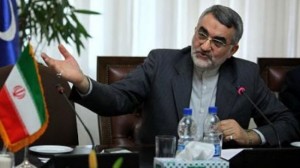[caption id="attachment_23974" align="alignright" width="180"]
 Iranian MP Alaeddin Boroujerdi[/caption]
Iranian MP Alaeddin Boroujerdi[/caption]A senior Iranian lawmaker has reiterated the Islamic Republic�s strong opposition to the�development or possession of nuclear weapons.
Today, the Islamic Republic of Iran has mastered all aspects of nuclear technology for peaceful purposes but it is firmly against the nuclear bomb, said Chairman of National Security and Foreign Policy Committee of Iran�s Majlis Alaeddin Boroujerdi.
Boroujerdi made the remarks in a meeting with a visiting British delegation headed by Jack Straw, the former British foreign secretary and a present member of the UK Parliament, in Tehran on Wednesday.
�We believe that the existence of even one [atomic] bomb in today�s world threatens global peace and security,� since it could trigger another disaster just like what happened in Hiroshima and Nagasaki in Japan, he added.
Commenting on Tehran-London ties, the top legislator said that Iran was ready to advance relations with the UK, which are currently at the level of non-resident charge d'affaires, based on mutual respect and interests and non-interference in one another�s domestic affairs.
Straw, for his part, described Iran as an influential power in the region and the world.
He said that the aim of the British delegation�s visit to Iran was to improve London-Tehran ties, expressing hope that obstacles to the further enhancement of bilateral ties would be removed.
Straw, who arrived in Tehran on Tuesday at the head of a four-member parliamentary delegation, said he was optimistic about the implementation of the Geneva nuclear deal signed between Iran and six world powers, and hoped that the agreement would lead to the lifting of anti-Iran sanctions and the return of the Iranian nuclear case from the UN Security Council to the International Atomic Energy Agency (IAEA).
Iran and six powers - Russia, China, France, Britain, the US and Germany - reached a deal on November 24, 2013 in the Swiss city of Geneva to set the stage for the settlement of the dispute over the Islamic Republic�s nuclear energy program.
Under the Geneva deal, the six countries undertook to provide Iran with some sanctions relief in exchange for Iran agreeing to limit certain aspects of its nuclear activities during a six-month period. It was also agreed that no nuclear-related sanctions would be imposed on Iran within the same timeframe.
By Press TV
The Iran Project is not responsible for the content of quoted articles.










